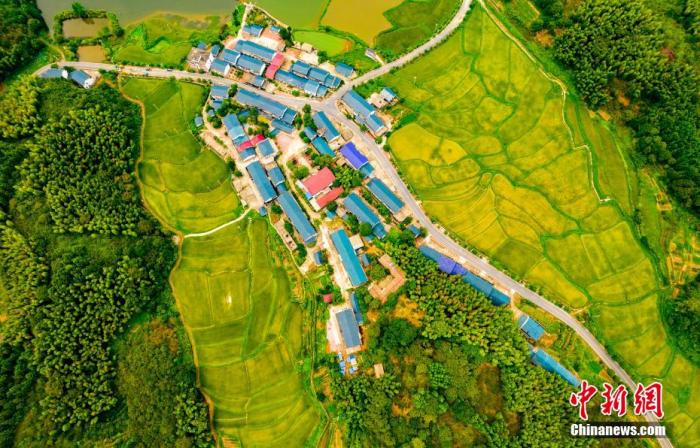(Observation of the Two Sessions) "Côte d'Affaires" have new challenges
China News Agency, Beijing, March 8 (Reporter Pang Wuji) The "Korean Specialists" who have played an important role in poverty alleviation are now facing a new challenge of rural revitalization.
"Cate Pai" is the abbreviation of Science and Technology Commissioner.
In February 1999, Nanping, Fujian sent the first batch of 225 science and technology commissioners to the countryside to provide scientific and technological services, which became the origin of China's science and technology commissioner system.
Data map: Aerial photography of the Lengshuitian Super Rice Test Base in Houyuan Village, Jiulongshan Township, Xiannvhu District, Xinyu City, Jiangxi Province.
Photo by Zhao Chunliang
Since then, hundreds of thousands of agricultural technicians have gone out of the laboratory and into the fields to diagnose problems for farmers, provide new ideas, teach techniques, and write "thesis on the field".
Some of them start businesses together with farmers, and some are deeply involved in the industrial chain, becoming the disseminators of agricultural science and technology, the leaders of technological innovation and entrepreneurship, and the leaders of rural poverty alleviation and prosperity.
The "Kortepai" system has also become a unique path for innovation and entrepreneurship in agricultural science and technology with Chinese characteristics.
Today, the Côte d'Affaires system has been implemented for more than 20 years.
After the victory in poverty alleviation, the focus of "three rural" work has shifted to comprehensively promoting rural revitalization. Does China still need a science and technology commissioner?
Ma Guoxiang, a member of the National Committee of the Chinese People's Political Consultative Conference and a member of the Standing Committee of the Central Committee of the Democratic National Construction Association, said in an exclusive interview with a reporter from China News Agency that the core of rural revitalization lies in industrial revitalization. In fact, there is a greater demand for science and technology commissioners and higher requirements.
"Côte d'Affaires" faces new challenges.
Ma Guoxiang believes that in the selection process of science and technology commissioners, there is a situation where the selection needs do not match, and the selection is first followed by adaptation.
Some commissioners cannot precisely connect with the local development of characteristic industries in rural areas.
In this regard, he suggested that the "Korte Pai" and the village should truly achieve "two-way choice" to achieve precise docking between supply and demand.
Digital approaches can help facilitate this process.
Ma Guoxiang believes that stunt commissioners also need to "go online".
In this way, farmers can receive consultation through the platform anytime, anywhere, achieve remote service, online guidance, instant feedback, and give full play to the role and advantages of science and technology commissioners.
Some places have been explored.
For example, Fujian launched the "Hui Nongxin" cloud platform, on the platform, farmers can "purchase" experts like online shopping, "place orders" for the production technical problems to be solved, and then "receive orders" online by the relevant "Ketepai" answer.
In addition to two-way selection and matching supply and demand, commissioners also need retraining.
Ma Guoxiang pointed out that pure school education is actually difficult to meet the needs of this special position.
Moreover, with the in-depth implementation of the rural revitalization strategy, the professional and technical fields of rural science and technology commissioners will expand from traditional agricultural technologies to other fields such as facility agriculture, digital agriculture, ecological agriculture, economic management, marketing, rural planning and even financial services. The first, second and tertiary industries integrate and develop related technical fields.
Therefore, Ma Guoxiang believes that it is necessary to do a good job in the retraining and improvement of the work of the commissioners, so as to improve the ability of the scientific and technological commissioners to serve the development of rural industries.
He suggested that, on the one hand, professionals related to the entire industrial chain of agricultural production could be mobilized to join the commission team to accelerate the promotion and application of new agricultural technologies and achievements.
On the other hand, according to the new needs of the revitalization of rural industries, train personnel with strong professional and technical ability and high scientific quality to serve as science and technology commissioners.
Of course, if we want to truly retain talents in rural areas, we also need to improve the treatment of the "Korte factions".
Ma Guoxiang believes that policies should be given to scientific and technological commissioners in terms of investment, professional title evaluation and employment, and transformation of achievements, and fully mobilize the enthusiasm and initiative of scientific and technological talents to take root in rural grassroots and serve "agriculture, rural areas and farmers", so as to ensure that scientific and technological commissioners can "go down". , hold on, do well."
In 2019, Guizhou piloted the annual salary system for science and technology commissioners.
16 deeply impoverished counties in the province have recruited 480 full-time science and technology commissioners nationwide, and the maximum annual salary of the recruited personnel can reach 500,000 yuan.
For the "science and technology commissioners" who form a community of interests with farmers, Nanping, Fujian encourages financial institutions to support the start-up of science and technology commissioners, and launches the risk compensation loan business for science and technology commissioners. cooperatives, family farms) to provide loan support.
(over)

